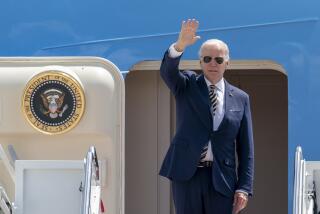Kohl Heading for Asia to Boost Trade Ties : Diplomacy: The 12-day, five-nation visit is the German chancellor’s first to the fast-growing region since unification in 1990.
- Share via
BERLIN — Chancellor Helmut Kohl embarks today on a five-nation Asian tour aimed at boosting his country’s political profile and expanding its economic ties with the fast-growing region.
The visit marks the first by a German chancellor to Asia since unification 2 1/2 years ago and comes at a time when Germany’s allies are pressing the country to play a greater global political role.
While Kohl’s 12-day itinerary takes him to India, Singapore and Indonesia, it is the final two stops on the tour--Japan and South Korea--that are considered the trip’s most important.
In Tokyo, Kohl is expected to deliver in person a message already underscored by other Western leaders from afar: Japan’s mounting trade surpluses pose a danger to global economic stability.
In Seoul, Kohl is scheduled to address the South Korean Parliament to explain the problems of unifying a nation long divided into Communist and free-market societies--an ordeal that looms for Korea and that Germany has struggled with for three years.
Germany, with the United States, has shared the title of the world’s leading exporting nation in recent years. It also shares the American problem of running a large trade deficit with Japan. In the past two years, Japan has sold roughly three times the amount of goods to Germany that it has bought. Japan’s surpluses with the 12-nation European Community, of which Germany is the largest member, jumped sharply last month.
“One aim of this trip is to stress the need for free and open trade,” a Kohl aide told reporters.
Chancellery sources said Kohl will discuss the Japanese desire to revamp the U.N. Security Council in a way to give both Japan and Germany permanent seats and will raise the sensitive issue of Russia’s permanent participation in the group of leading industrial nations, also known as the Group of Seven. The next meeting of the G-7 countries is scheduled for this summer in Japan.
Under Kohl, Germany has become Russia’s largest aid donor as well as a kind of informal marriage broker, working to ease ties between Moscow and key Western institutions.
But Japan has so far withheld major financial and technical help, claiming that Moscow must first return four northern islands occupied by Soviet forces in the final days of World War II.
On the issue of a revamped Security Council, Kohl has not rejected the idea of a permanent German seat but has stressed that it is far down his political agenda.
Constitutional restrictions that now limit Germany’s military involvement to the 16-nation Western alliance region virtually preclude any immediate wider German political role in the world body, Kohl claims. He is leading efforts to lift these restrictions.
More to Read
Sign up for Essential California
The most important California stories and recommendations in your inbox every morning.
You may occasionally receive promotional content from the Los Angeles Times.












